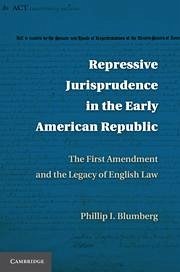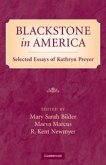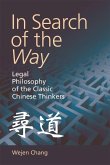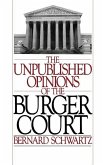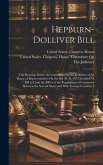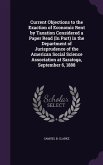Phillip I Blumberg
Repressive Jurisprudence in the Early American Republic
The First Amendment and the Legacy of English Law
Phillip I Blumberg
Repressive Jurisprudence in the Early American Republic
The First Amendment and the Legacy of English Law
- Gebundenes Buch
- Merkliste
- Auf die Merkliste
- Bewerten Bewerten
- Teilen
- Produkt teilen
- Produkterinnerung
- Produkterinnerung
Explains how America adopted the widely deplored Sedition Act of 1798 and how it undermined the political ideals of the American Revolution.
Andere Kunden interessierten sich auch für
![Blackstone in America Blackstone in America]() Mary BilderBlackstone in America71,99 €
Mary BilderBlackstone in America71,99 €![In Search of the Way In Search of the Way]() Wejen ChangIn Search of the Way191,99 €
Wejen ChangIn Search of the Way191,99 €![The Unpublished Opinions of the Burger Court The Unpublished Opinions of the Burger Court]() Bernard SchwartzThe Unpublished Opinions of the Burger Court182,99 €
Bernard SchwartzThe Unpublished Opinions of the Burger Court182,99 €![Hepburn-Dolliver Bill: Full Hearings Before the Committee On the Judiciary of the House of Representatives On the Bill (H. R. 4072) Entitled Hepburn-Dolliver Bill: Full Hearings Before the Committee On the Judiciary of the House of Representatives On the Bill (H. R. 4072) Entitled]() Hepburn-Dolliver Bill: Full Hearings Before the Committee On the Judiciary of the House of Representatives On the Bill (H. R. 4072) Entitled33,99 €
Hepburn-Dolliver Bill: Full Hearings Before the Committee On the Judiciary of the House of Representatives On the Bill (H. R. 4072) Entitled33,99 €![Current Objections to the Exaction of Economic Rent by Taxation Considered a Paper Read (In Part) in the Department of Jurisprudence of the American Social Science Association at Saratoga, September 6, 1888 Current Objections to the Exaction of Economic Rent by Taxation Considered a Paper Read (In Part) in the Department of Jurisprudence of the American Social Science Association at Saratoga, September 6, 1888]() Samuel B ClarkeCurrent Objections to the Exaction of Economic Rent by Taxation Considered a Paper Read (In Part) in the Department of Jurisprudence of the American Social Science Association at Saratoga, September 6, 188831,99 €
Samuel B ClarkeCurrent Objections to the Exaction of Economic Rent by Taxation Considered a Paper Read (In Part) in the Department of Jurisprudence of the American Social Science Association at Saratoga, September 6, 188831,99 €![The Cambridge Companion to European Criminal Law The Cambridge Companion to European Criminal Law]() The Cambridge Companion to European Criminal Law133,99 €
The Cambridge Companion to European Criminal Law133,99 €![An Independent, Colonial Judiciary: A History of the Bombay High Court During the British Raj, 1862-1947 An Independent, Colonial Judiciary: A History of the Bombay High Court During the British Raj, 1862-1947]() Abhinav ChandrachudAn Independent, Colonial Judiciary: A History of the Bombay High Court During the British Raj, 1862-194736,99 €
Abhinav ChandrachudAn Independent, Colonial Judiciary: A History of the Bombay High Court During the British Raj, 1862-194736,99 €-
-
-
Explains how America adopted the widely deplored Sedition Act of 1798 and how it undermined the political ideals of the American Revolution.
Produktdetails
- Produktdetails
- Verlag: Cambridge-Hitachi
- Seitenzahl: 424
- Erscheinungstermin: 30. September 2010
- Englisch
- Abmessung: 226mm x 157mm x 30mm
- Gewicht: 699g
- ISBN-13: 9780521191357
- ISBN-10: 0521191351
- Artikelnr.: 30883155
- Herstellerkennzeichnung
- Libri GmbH
- Europaallee 1
- 36244 Bad Hersfeld
- gpsr@libri.de
- Verlag: Cambridge-Hitachi
- Seitenzahl: 424
- Erscheinungstermin: 30. September 2010
- Englisch
- Abmessung: 226mm x 157mm x 30mm
- Gewicht: 699g
- ISBN-13: 9780521191357
- ISBN-10: 0521191351
- Artikelnr.: 30883155
- Herstellerkennzeichnung
- Libri GmbH
- Europaallee 1
- 36244 Bad Hersfeld
- gpsr@libri.de
Phillip Blumberg is Dean and Professor Emeritus at University of Connecticut School of Law. After two decades of law practice on Wall Street and leadership as the CEO of a New York Stock Exchange-listed financial corporation, he turned to legal scholarship. He is the country's leading authority on corporate groups and the author of path-breaking books including The Multinational Challenge to Corporation Law and the five-volume treatise Blumberg on Corporate Groups (2nd edition). Six years ago, he became interested in early American jurisprudence; this volume is the result.
1. Political and jurisprudential worlds in conflict in the new Republic; 2.
Politics in the new Republic; 3. Seditious and criminal libel in the
colonies, the states, and the early Republic during the Washington
administration; 4. Federalist partisan use of seditious libel - statutory
and common; 5. Seditious and criminal libel during the Jefferson and
Madison administrations 1800-16; 6. Partisan prosecutions for seditious and
criminal libel in the state courts: federalists against republicans,
republicans against federalists, and republicans against dissident
republicans in struggles for party control; 7. Established jurisprudential
doctrines (other than seditious and criminal libel) available in the new
Republic for suppression of anti-establishment speech; 8. Still other
nineteenth-century doctrines for suppression of anti-establishment speech:
the law of blasphemy and the slave-state anti-abolition statutes; 9.
Conclusion.
Politics in the new Republic; 3. Seditious and criminal libel in the
colonies, the states, and the early Republic during the Washington
administration; 4. Federalist partisan use of seditious libel - statutory
and common; 5. Seditious and criminal libel during the Jefferson and
Madison administrations 1800-16; 6. Partisan prosecutions for seditious and
criminal libel in the state courts: federalists against republicans,
republicans against federalists, and republicans against dissident
republicans in struggles for party control; 7. Established jurisprudential
doctrines (other than seditious and criminal libel) available in the new
Republic for suppression of anti-establishment speech; 8. Still other
nineteenth-century doctrines for suppression of anti-establishment speech:
the law of blasphemy and the slave-state anti-abolition statutes; 9.
Conclusion.
1. Political and jurisprudential worlds in conflict in the new Republic; 2.
Politics in the new Republic; 3. Seditious and criminal libel in the
colonies, the states, and the early Republic during the Washington
administration; 4. Federalist partisan use of seditious libel - statutory
and common; 5. Seditious and criminal libel during the Jefferson and
Madison administrations 1800-16; 6. Partisan prosecutions for seditious and
criminal libel in the state courts: federalists against republicans,
republicans against federalists, and republicans against dissident
republicans in struggles for party control; 7. Established jurisprudential
doctrines (other than seditious and criminal libel) available in the new
Republic for suppression of anti-establishment speech; 8. Still other
nineteenth-century doctrines for suppression of anti-establishment speech:
the law of blasphemy and the slave-state anti-abolition statutes; 9.
Conclusion.
Politics in the new Republic; 3. Seditious and criminal libel in the
colonies, the states, and the early Republic during the Washington
administration; 4. Federalist partisan use of seditious libel - statutory
and common; 5. Seditious and criminal libel during the Jefferson and
Madison administrations 1800-16; 6. Partisan prosecutions for seditious and
criminal libel in the state courts: federalists against republicans,
republicans against federalists, and republicans against dissident
republicans in struggles for party control; 7. Established jurisprudential
doctrines (other than seditious and criminal libel) available in the new
Republic for suppression of anti-establishment speech; 8. Still other
nineteenth-century doctrines for suppression of anti-establishment speech:
the law of blasphemy and the slave-state anti-abolition statutes; 9.
Conclusion.

